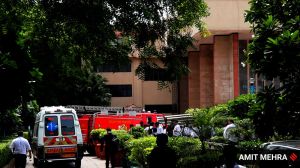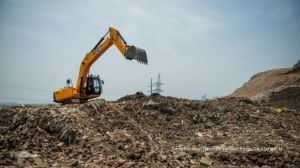Clipping our own wings
Which is the best airline in the world? That’s probably an impossible question to answer. The answer varies from survey to survey and t...

Which is the best airline in the world? That’s probably an impossible question to answer. The answer varies from survey to survey and there is always some subjectivity in respondents’ replies.
For Asia, one survey finds Cathay Pacific to be the best, followed by Singapore Airlines. An US-based survey finds Southwest to be the best. An apparently global survey finds Air New Zealand to be the best, followed by Singapore Airlines.
Yet another global survey finds KLM to be the best, followed by Swissair. Notice in all these surveys, Air-India is the only Indian airline to be ranked.
That’s understandable. To figure in such surveys you have to be an international airline and even Indian Airlines isn’t quite that. Hence the impression, Indian carriers aren’t quite up to the mark and are among the worst in the world. Having just got back from a trip to the US and having travelled only on US airlines, I disagree.
And in advancing this proposition, I am ignoring security-related issues. Once upon a time, long-distance train travel used to be different. Those who are on the wrong side of forty will probably remember that as an age of hold-alls.
You got into the train, took off your shoes and unpacked your slippers from the hold-all, readying yourself for the long journey. In a way, airlines had the same idea, especially if you were on business or first class. You took off your shoes and wore the socks that were provided.
After 9/11, this is an era of enhanced security and there are supposedly random security checks. Interpretation of the word “random” is also subjective, because if your skin or passport is of the wrong colour, the computer will certainly pick you. Apart from extra frisking, you will be asked to take off your shoes. I think it is time to reverse the old principle.
Be barefoot or wear your slippers until you are on the plane. Once you are on the plane, you can afford to wear your shoes. But, as I said, I am not complaining about security-related hassles or the fact that, within the US, checked in baggage can also be randomly searched.
We organised a conference recently and invited some American speakers. The conference was held in Goa, but customs and immigration had to be done in Mumbai or Delhi, the port of entry. Why can’t customs and immigration be done in Goa, why subject tourists to this unnecessary hassle?
India needs to be much more tourist-friendly. Perhaps. But, as far as I know, the US has had customs and immigration at point of first entry, much before 9/11. The food (even on Jet or Sahara) is bad. Perhaps. But as far as I know, several flights in the US, even if they are four hours long, have no food. These are beverage-only flights.
I don’t want to waste column space with my US itinerary. But I do want to give you two examples. The first instance concerns US Airline No 1, on the sector from Frankfurt to Chicago. We boarded the plane and were made to wait for four hours on the plane, because there was a technical problem.
Because power had to be turned off, there was often no air-conditioning and we were thanked profusely for our patience. In the process, I missed my connecting flight from Chicago, but that is a separate matter. Had this happened in India, hell would have broken loose.
The second instance concerns US Airline No 2 and I was travelling from Dallas to Fayetteville, with transit in Houston. At Fayetteville, my checked-in bag didn’t turn up. On the flight, I read a wonderful in-flight magazine, with a wonderful account of how everything has been computerised in Houston.
You immediately know where any bag is. Hence, by plugging into the computer, the guys in Fayetteville knew the bag hadn’t been loaded in Houston. It would turn up in the afternoon and would be delivered to my local address. Afternoon comes and no bag turns up.
Remember this is the era of 1-800 numbers with all calls answered from Houston and you can’t even speak to the airline office in Fayetteville. It isn’t listed. The bag would turn up in the evening. It wasn’t the case that the bag hadn’t been loaded in Houston. It hadn’t been unloaded in Fayetteville and had gone on to Newark.
As soon as evening comes, I will receive a call and my bag will be delivered. Evening turns into night and, finally, I venture off to the airport again and find my bag sitting there. It had indeed come in the evening, but no one had bothered to inform me. No doubt it would have been delivered eventually. Again, the point is not my individual complaint. Had this happened in India, all hell would have broken loose.
I find such reactions puzzling. If the quality of goods and services in India is known to be bad, the threshold levels for tolerance should be higher in India, not lower. Is it because we systematically under-sell the country? Is it that higher transaction costs associated with inadequate airport and other infrastructure reduce tolerance levels? Contrary to what is often believed, I think in several services sectors (including airlines), India has the competitive advantage to take on the world.
The problem is the global face projected by India is that of Air-India, not Jet, Sahara or even Indian Airlines. I don’t see why these Indian carriers shouldn’t be allowed to fly international routes as well. The argument that landing rights are negotiated bilaterally and can therefore only be granted to national carriers is bunkum. As things stand, Air-India can’t even use these landing rights and hawks them to carriers like Virgin. How is Virgin more Indian than Jet, Sahara or Indian Airlines? If we throw open our skies, and perhaps even privatise Air-India, we will be able to argue that other countries should also throw open their skies. Open up the Geneva-Brussels sector say, a favourite route for trade negotiators. Open up domestic US air space. That developed countries won’t agree isn’t the point. Why won’t developed countries agree? Because they know they are losing competitive advantage not just in manufacturing, but also in services. That indeed is the point.
We need to be more aggressive and confident and less self-deprecating. We also need to consciously recognise that Indian service sector providers don’t necessarily have to be public sector service providers and this is also true of airport infrastructure. Next time I travel to the US and within it, I will probably get better choice.
Photos



- 01
- 02
- 03
- 04
- 05




























